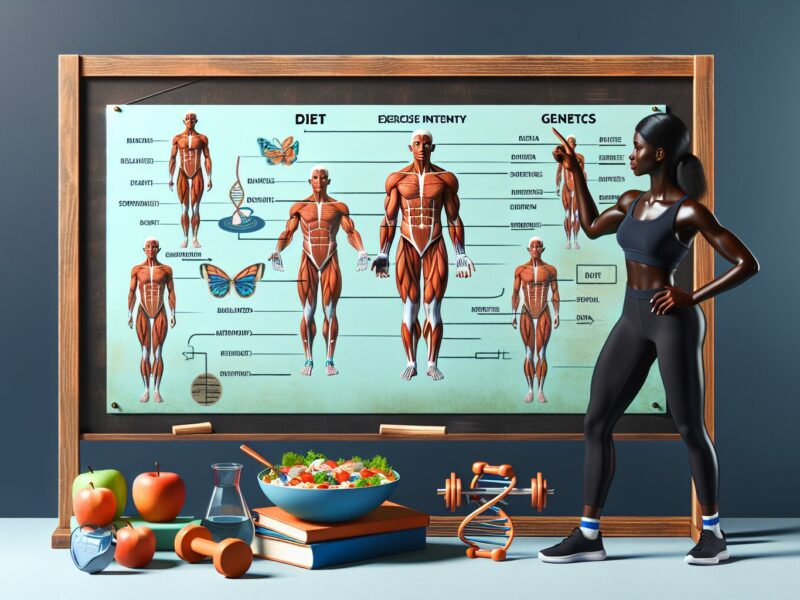Have you ever wondered how long it takes to transform your body into a chiseled masterpiece? “How Long Does It Take To Get Jacked?” explores the timeline and factors involved in achieving a sculpted physique. From consistent training and proper nutrition to genetics and dedication, this article uncovers the secrets behind the process of building an impressive muscular physique. So, if you’re eager to know how long it takes to get the body of your dreams, buckle up and let’s explore the journey together.
Factors Affecting How Long It Takes to Get Jacked
Getting “jacked,” or achieving a muscular and toned physique, is a goal that many individuals strive for. However, the time it takes to achieve this goal can vary greatly depending on several factors. In this article, we will explore the various factors that can impact how long it takes for you to get jacked and discuss how each of these factors plays a role in your journey to a muscular and well-defined physique.
Genetics
One of the primary factors that influence how long it takes to get jacked is your genetic makeup. Genetics can have a significant impact on muscle growth and athletic performance. Some individuals may be genetically predisposed to have a greater potential for muscle growth, while others may find it more challenging to build and maintain muscle mass.
Genetics can also determine muscle fiber type and distribution. There are two main types of muscle fibers: slow-twitch and fast-twitch. Slow-twitch fibers are more endurance-focused, while fast-twitch fibers are responsible for explosive movements and strength. The distribution of these fibers can vary among individuals, which may affect their ability to build muscle and excel in certain athletic endeavors.
Furthermore, genetics can affect your metabolism and body composition. Some people naturally have a faster metabolism, allowing them to burn calories more efficiently and potentially build muscle more easily. On the other hand, others may have a slower metabolism, making it more challenging to lose fat and gain muscle mass. Understanding your genetic predispositions can help you tailor your training and nutrition approach and set realistic expectations for your progress.
Training Experience
Your training experience is another crucial factor that affects how long it takes to get jacked. For beginners, the journey to a muscular physique may appear more daunting as they are starting from scratch. However, starting as a novice means that you have a lot of room for rapid progress. With consistent training and proper guidance, novices can experience significant gains in muscle size and strength.
As you progress from being a novice to an intermediate and then an advanced lifter, the rate of progress may naturally slow down. This is known as diminishing returns, where it becomes increasingly challenging to continue making significant gains. To combat plateaus, it is crucial to vary your workouts, constantly challenging your muscles with new exercises, training techniques, and rep ranges.
Skill development and movement proficiency are also important aspects of training experience. It takes time to learn proper form and technique, which can significantly impact your ability to effectively target specific muscle groups. A focus on developing movement proficiency and honing your lifting skills can enhance your training sessions and expedite your progress.

Age
Age is another factor that can influence how long it takes to get jacked. As we age, our hormone levels naturally decline, which can affect muscle and strength development. Testosterone, a hormone critical for muscle growth, tends to decline with age, making it more challenging to build and maintain muscle mass.
Additionally, recovery ability and injury prevention can be impacted by age. Older individuals may take longer to recover from intense workouts and are more prone to injuries. It is essential for individuals in older age groups to prioritize injury prevention strategies and incorporate proper rest and recovery periods into their training routines to avoid setbacks.
However, it is important to note that age should not discourage anyone from pursuing their fitness goals. While progress may be slower compared to younger individuals, consistent training and smart programming can still lead to significant improvements in muscle mass and overall strength.
Nutrition
Nutrition plays a vital role in how long it takes to get jacked. Building muscle requires a caloric surplus, meaning you need to consume more calories than you burn. This surplus provides the energy necessary for muscle growth. However, it is essential to strike a balance between consuming enough calories to support muscle growth without excessive fat gain.
Macronutrient distribution is another critical aspect of nutrition for muscle growth. It is generally recommended to consume adequate amounts of protein, carbohydrates, and fats to support muscle development. Protein, in particular, is crucial for muscle repair and growth. Aim for a protein intake of around 0.8 to 1 gram per pound of body weight.
While macronutrients are vital, it is essential not to overlook micronutrients and supplements. Micronutrients, such as vitamins and minerals, play a role in various physiological processes that support muscle growth and overall health. In some cases, supplements may be beneficial, especially for individuals with specific nutrient deficiencies or those with unique dietary requirements. However, it is important to note that supplements should complement a well-rounded diet and training regimen and should not replace whole foods.

Consistency
Consistency is key when it comes to seeing progress in your journey to getting jacked. Regular training and adherence to your program are crucial for achieving your desired physique. Skipping workouts or engaging in frequent breaks or long periods of inactivity can slow down your progress and hinder muscle growth.
Consistency also extends beyond just training. Maintaining a balanced lifestyle that includes proper nutrition, adequate sleep, and stress management is essential for optimizing your progress. Neglecting any of these areas can have a detrimental impact on your body’s ability to build and maintain muscle mass.
Workout Intensity
Workout intensity plays a significant role in how long it takes to get jacked. Progressive overload, which involves gradually increasing the weight or intensity of your workouts, is key for stimulating muscle growth. Continually challenging your muscles by pushing them to their limits will help promote hypertrophy, or muscle growth.
Training to failure, where you perform repetitions until you cannot complete another one with proper form, can also be a valuable tool for promoting muscle growth. High-intensity interval training (HIIT) can further enhance your progress by increasing calorie burn and boosting cardiovascular fitness. Additionally, incorporating compound exercises that target multiple muscle groups simultaneously can maximize muscle recruitment and help you make faster progress.

Rest and Recovery
While training is vital for muscle growth, rest and recovery are equally important. Proper sleep is crucial for overall health and plays a significant role in muscle repair and growth. During sleep, our bodies release growth hormone, which stimulates muscle synthesis and repair. Aim for 7-9 hours of quality sleep each night to optimize your recovery and progress.
Active recovery techniques, such as stretching, foam rolling, and low-intensity cardiovascular exercise, can aid in muscle recovery and reduce muscle soreness. Additionally, avoiding overtraining is crucial to prevent setbacks and injuries. It is essential to listen to your body’s signals and incorporate rest days and deload weeks into your training plan to allow for sufficient recovery.
Supplementation
Supplements can play a supportive role in your journey to getting jacked. However, it is important to approach supplementation with caution and understanding. Different supplements have varying levels of effectiveness, and individual needs and goals should always be considered.
Some popular supplements for muscle growth include protein powder, creatine, and branched-chain amino acids (BCAAs). Protein powder can help individuals meet their daily protein requirements, while creatine has been shown to enhance muscle strength and power. BCAAs can aid in muscle recovery and reduce muscle soreness. It is essential to research and consult with a healthcare professional before incorporating supplements into your routine, as some may have potential risks and side effects.

Goal Specificity
Defining your desired physique and setting specific goals is crucial for determining how long it will take to get jacked. The amount of time required to build a muscular and well-defined physique can vary greatly depending on individual aspirations.
If your focus is primarily on gaining strength, your training and nutrition plans will prioritize heavy lifting and a caloric surplus. Hypertrophy-focused goals will require a combination of strength training and specific rep ranges and exercises to promote muscle growth. Endurance-focused goals may involve higher repetition ranges and incorporating cardiorespiratory exercises into your routine.
Customizing your training and nutrition plans according to your specific goals will help you maximize your progress and achieve your desired physique in a more efficient manner.
In conclusion, several factors influence how long it takes to get jacked. Genetics, training experience, age, nutrition, consistency, workout intensity, rest and recovery, supplementation, and goal specificity all play a role in determining the timeline for achieving a muscular physique. Understanding these factors and tailoring your approach accordingly can help you navigate your journey to getting jacked and set realistic expectations for your progress. Remember, slow and steady progress is more sustainable and ultimately leads to long-term success. Keep working hard, stay consistent, and enjoy the process of transforming your body and improving your overall health and wellbeing.


